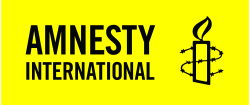
Back Amnestie Internasionaal Afrikaans Amnesty International ALS منظمة العفو الدولية Arabic Amnistía Internacional AST Amnesty International Azerbaijani Amnesty International BAR Amnesty International Byelorussian Міжнародная амністыя BE-X-OLD Амнести Интернешънъл Bulgarian एमनेस्टी इंटरनेशनल Bihari
 | |
| Founded | July 1961 United Kingdom |
|---|---|
| Founders | |
| Type | |
| Headquarters | London, WC1 United Kingdom |
| Location |
|
| Services | Protecting human rights |
| Fields | Media attention, direct-appeal campaigns, research, lobbying |
| Members | More than ten million members and supporters[1] |
| Agnès Callamard[2] | |
| Website | amnesty.org |
Amnesty International (also referred to as Amnesty or AI) is an international non-governmental organization focused on human rights, with its headquarters in the United Kingdom. The organization says it has more than ten million members and supporters around the world.[1] The stated mission of the organization is to campaign for "a world in which every person enjoys all of the human rights enshrined in the Universal Declaration of Human Rights and other international human rights instruments."[3] The organization has played a notable role on human rights issues due to its frequent citation in media and by world leaders.[4][5]
AI was founded in London in 1961 by the lawyer Peter Benenson.[6] In what he called "The Forgotten Prisoners" and "An Appeal for Amnesty", which appeared on the front page of the British newspaper The Observer, Benenson wrote about two students who toasted to freedom in Portugal and four other people who had been jailed in other nations because of their beliefs. AI's original focus was prisoners of conscience, with its remit widening in the 1970s, under the leadership of Seán MacBride and Martin Ennals, to include miscarriages of justice and torture. In 1977, it was awarded the Nobel Peace Prize. In the 1980s, its secretary general was Thomas Hammarberg, succeeded in the 1990s by Pierre Sané. In the 2000s, it was led by Irene Khan.
Amnesty draws attention to human rights abuses and campaigns for compliance with international laws and standards. It works to mobilize public opinion to generate pressure on governments where abuse takes place.[7]
- ^ a b Cite error: The named reference
whoaiwas invoked but never defined (see the help page). - ^ "Dr Agnès Callamard appointed as Secretary General of Amnesty International". amnesty.org. 29 March 2021. Retrieved 4 April 2021.
- ^ "Amnesty International's Statute". Amnesty International. Archived from the original on 27 September 2023.
- ^ Wong, Wendy (2012). Internal Affairs: How the Structure of NGOs Transforms Human Rights. Cornell University Press. p. 84. doi:10.7591/j.cttq43kj (inactive 1 November 2024). ISBN 978-0-8014-5079-2. JSTOR 10.7591/j.cttq43kj.8.
{{cite book}}: CS1 maint: DOI inactive as of November 2024 (link) - ^ Srivastava, Swati (2022), "Shadowing for Human Rights through Amnesty International", Hybrid Sovereignty in World Politics, Cambridge University Press, pp. 185–228, doi:10.1017/9781009204453.007, ISBN 978-1-009-20445-3
- ^ Benenson, Peter (28 May 1961). "The Forgotten Prisoners". The Observer. Retrieved 28 May 2011.
- ^ "About Amnesty International". Amnesty International. Retrieved 20 July 2008.